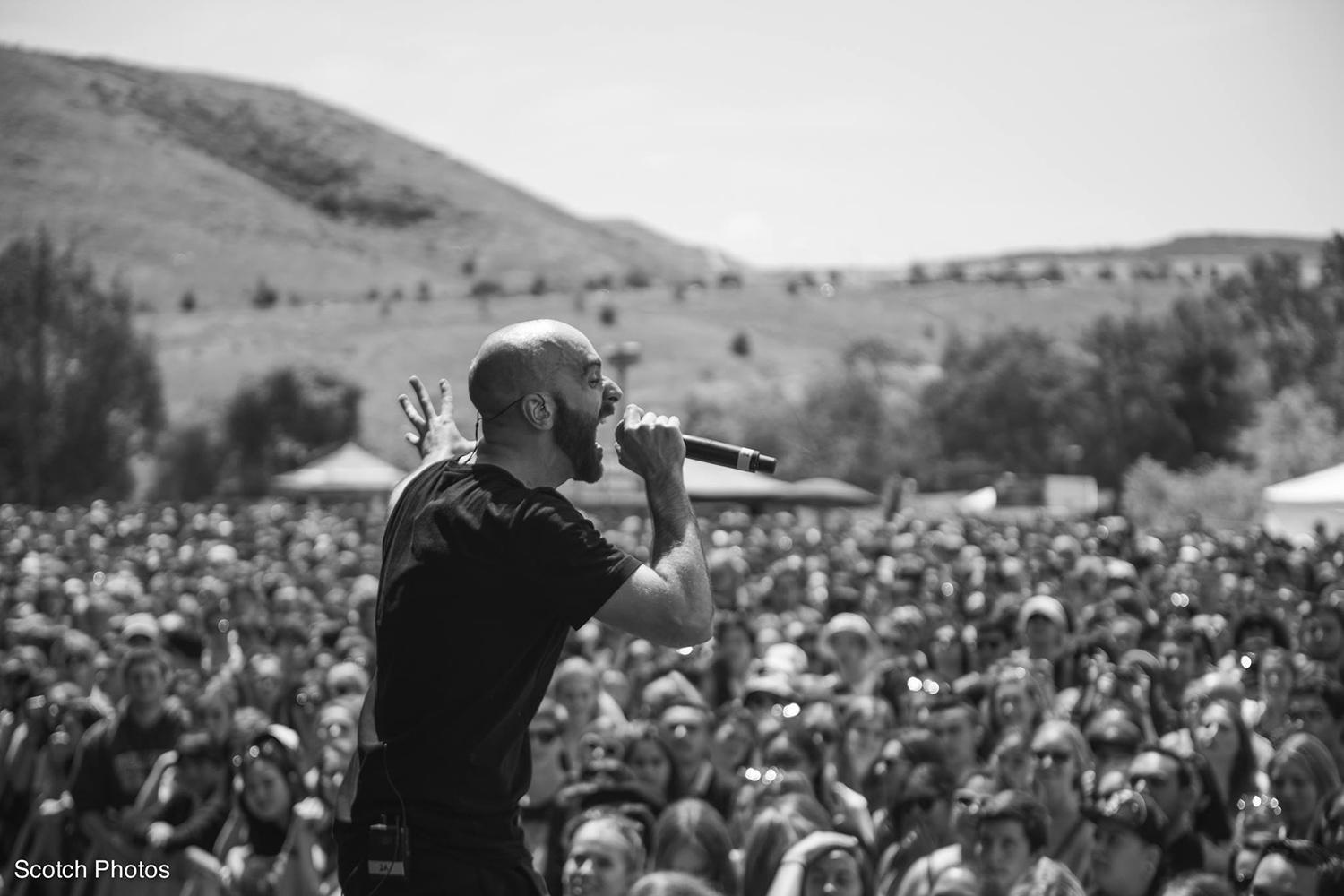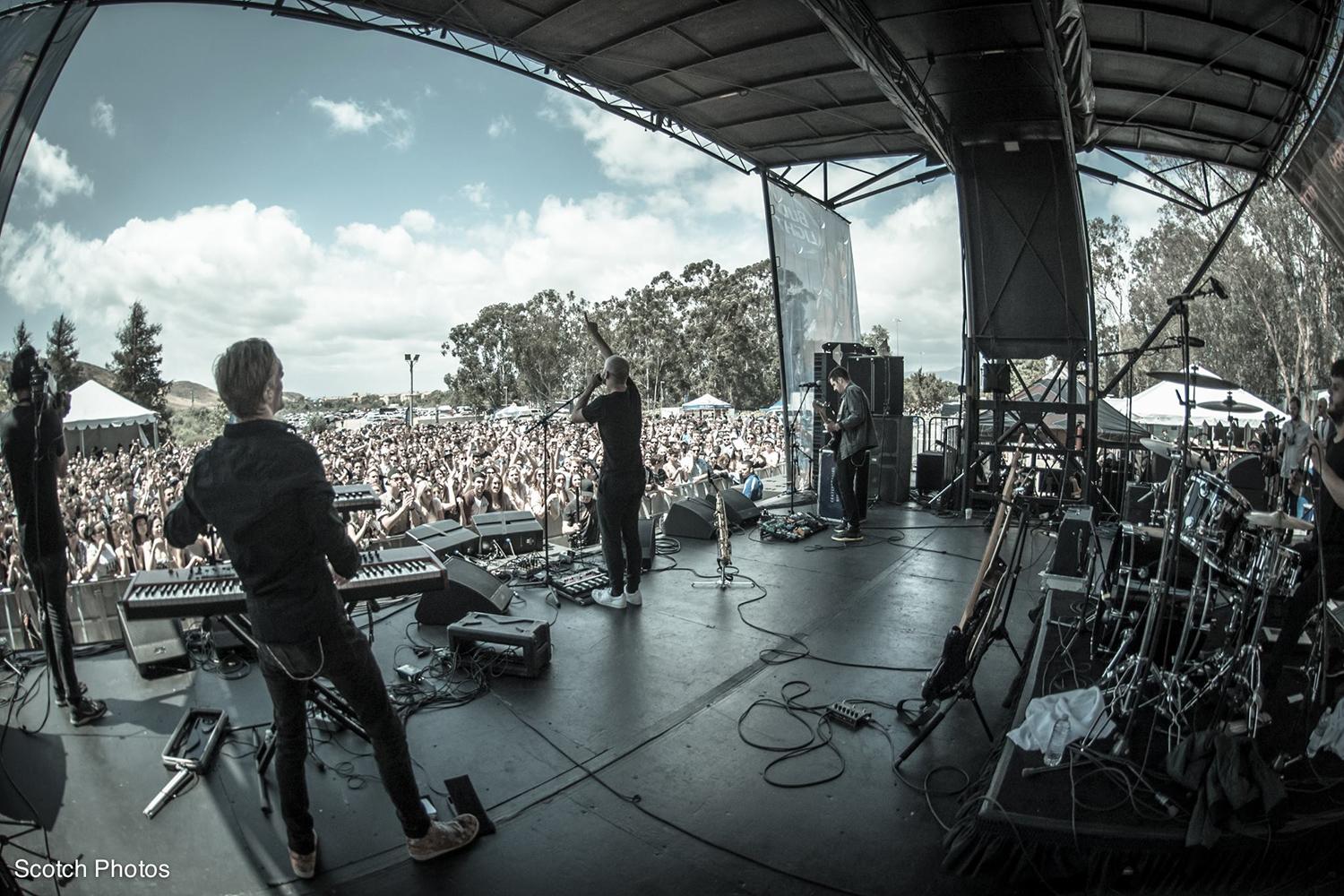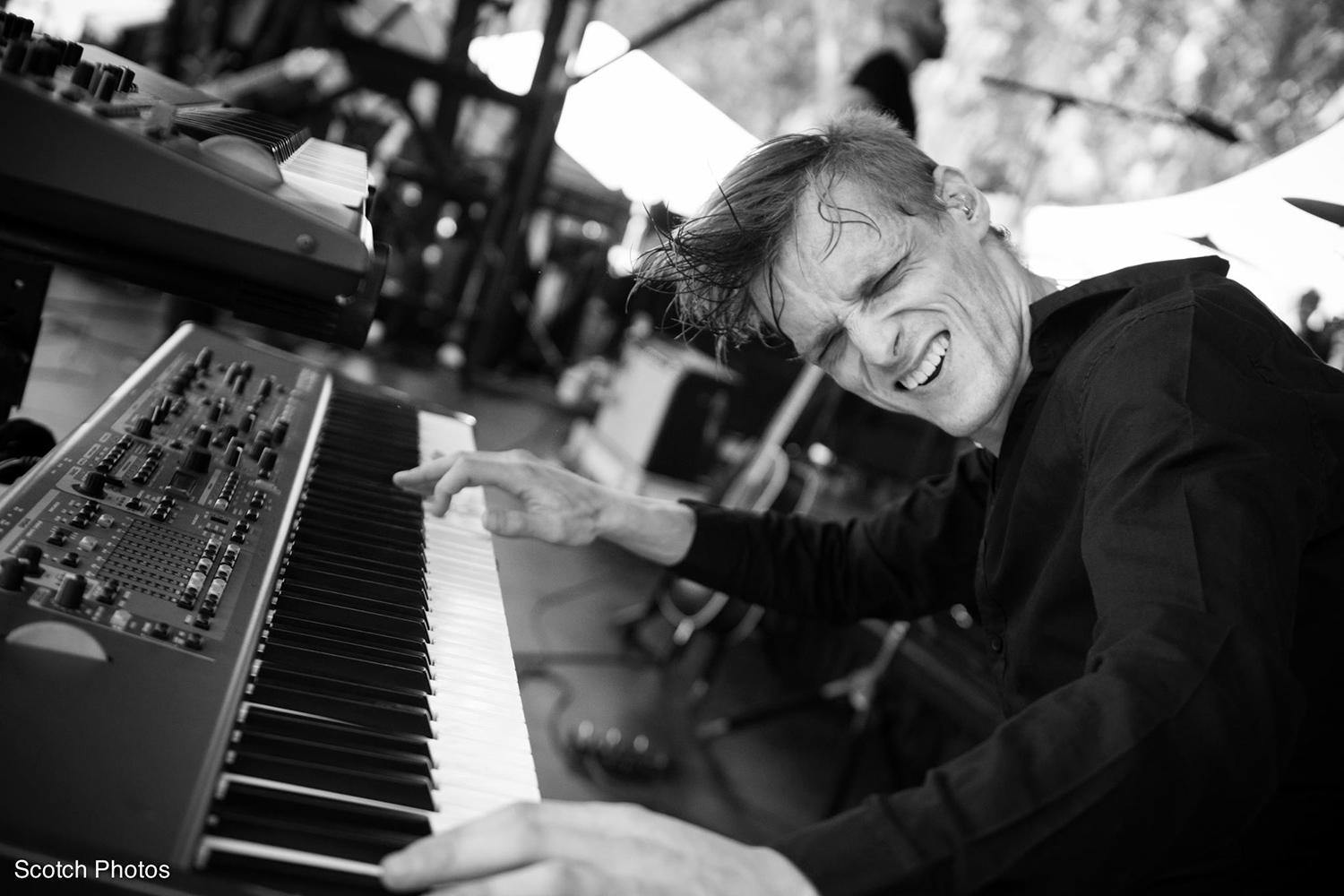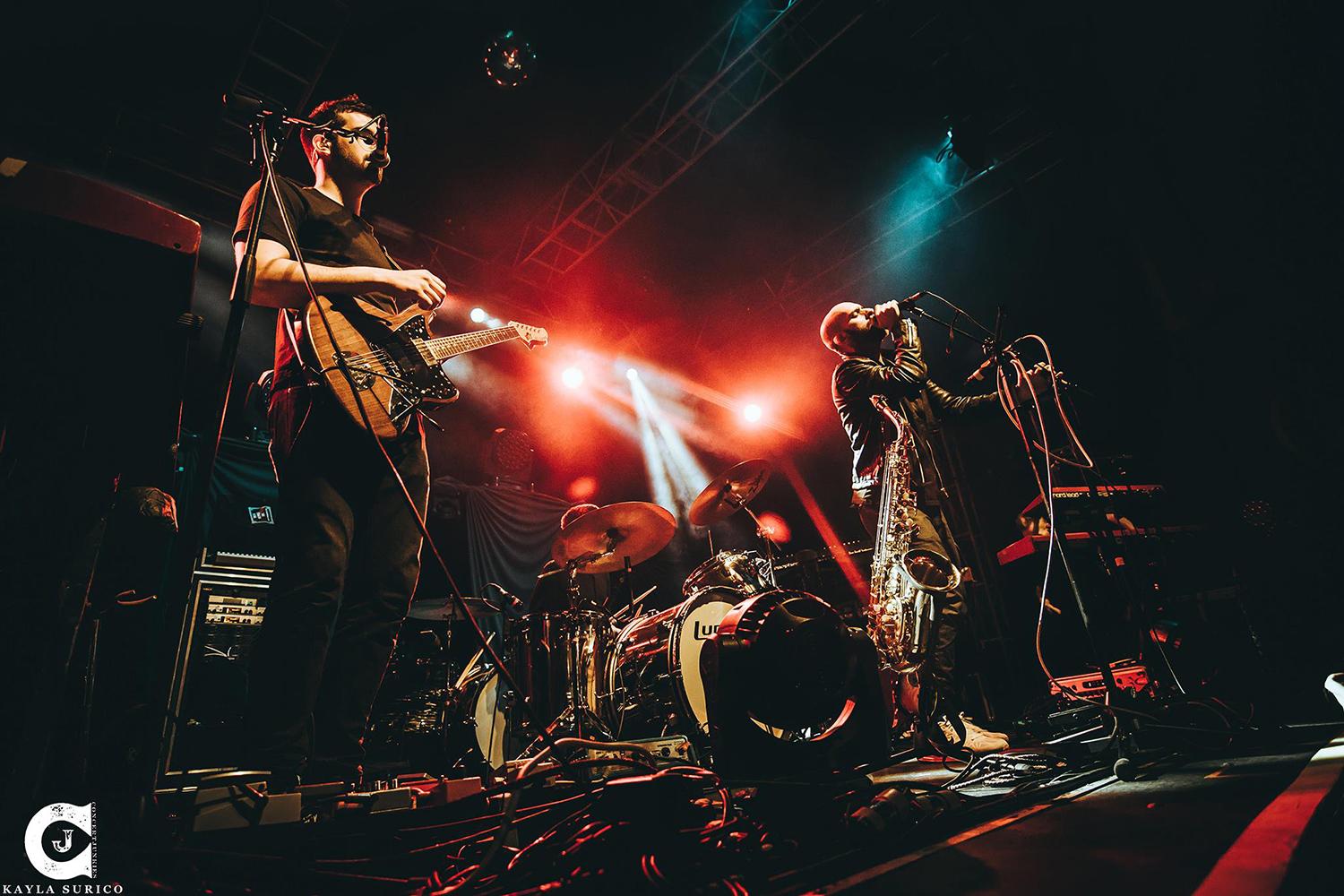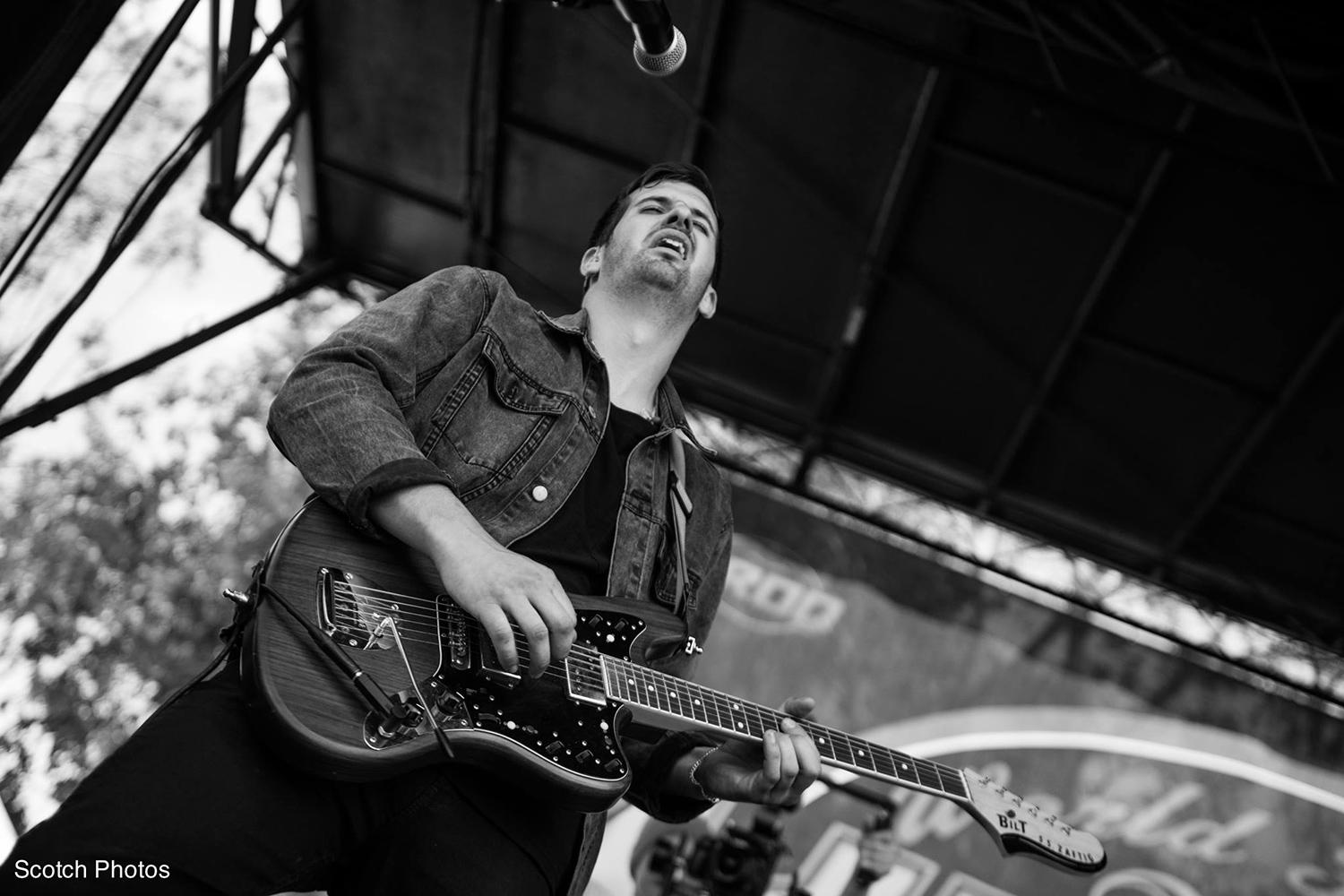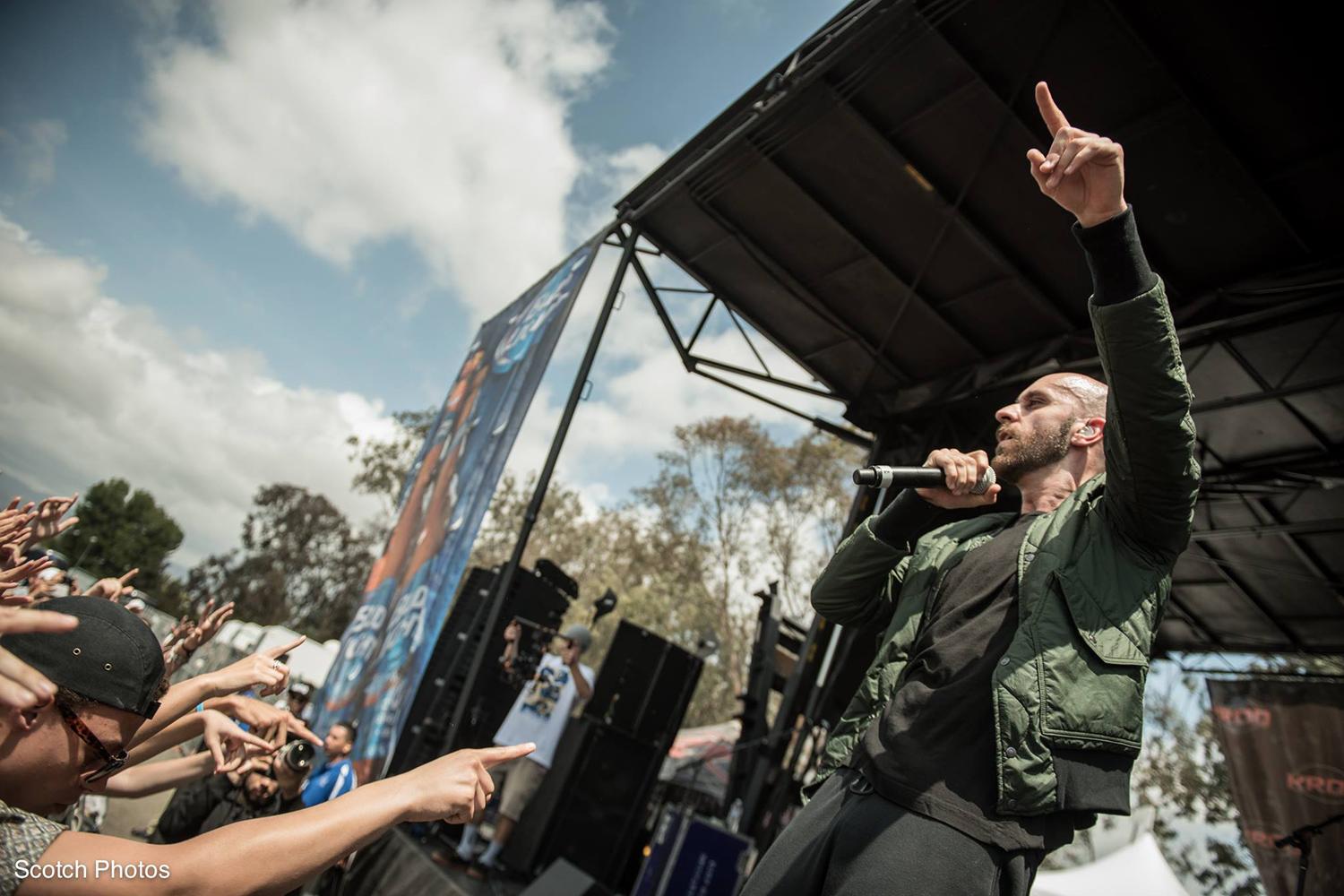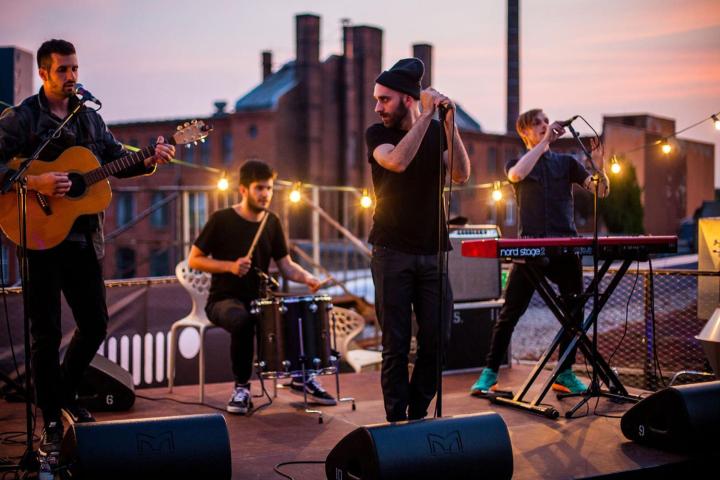
“I always wanted to write in the pop structure. It’s where I feel most comfortable communicating from.”
It’s a powerful thing when a new song becomes instantly ubiquitous. It’s even more powerful when the same song has enough staying power to become one of the year’s biggest anthems.
Such has been the case for X Ambassadors’ uber-catchy Renegades, which recently shot to the number one slot on alternative radio, thanks to massive airplay and fist-pumping lyrics like “Long live the pioneers/rebels and mutineers” and “All hail the outlaws/Spielbergs and Kubricks.” Admits X Ambassadors singer/songwriter Sam Harris, “There are lots of movie references throughout the record. I didn’t really expect or plan to consciously do that; it just ended up happening. All of those movies were a big part of my childhood, like Indiana Jones and all the [Steven] Spielberg and [Stanley] Kubrick movies. They were all big, big parts of growing up.”
It doesn’t hurt that Renegades is also the signature soundtrack to Jeep’s current ad campaign. “This song just happened to be perfect for that campaign — really perfect,” says Harris. “They thought so too, and they put it in the commercial. It’s really helped us a lot. It’s a way for young bands like us to get exposure. The reaction to it has been amazing, just amazing.”
What’s also amazing is that X Ambassadors are no one-hit wonders, as the 14 songs on their debut album VHS — out today from KIDinaKORNER/Interscope on various formats — consistently deliver with instantly singable lyrics and postmodern driving beats, from the piano stomp of Hang On to the metallic grind of Superpower to the universal lament of Loveless. “Me, I’ve loved pop music, in its essence, since I was very young,” Harris explains. “We wrote so many songs for the album, and we picked the best ones for it out of that batch, the ones we felt were the most catchy.”
On the cusp of hearing VHS spinning out from every phone and car you’ll pass by this summer, Harris called Digital Trends to discuss his thoughts on streaming, the band’s lo-fi leanings when they record, and dressing in drag to sing a Prince song. All hail the new kids.
Digital Trends: How great is it to get such great, powerful feedback on a song like Renegades, something that essentially had an instantaneous impact?
Sam Harris: It feels great. Just from the moment Jeep decided to put it in a commercial to the week it became number one at alternative radio — we really worked our asses off on this thing, so it means a lot to hear that.
What was the starting point for Renegades? Was it the acoustic guitar line, or did you have some of the lyrics that you built the percussive vibe off of?
Alex [da Kid, VHS’s executive producer and KIDinaKORNER’s label head] came to me with an idea to write this song called Renegades. And I was like, “All right.” He and I went into our own little world and started messing with the foundations to the track. We landed on this acoustic guitar one, and I wrote this hook over it.
From there, I wrote most of the lyrics and just the foundational part, the acoustic guitar. After the song was all finished, everybody in the band came in and put their own little touches to it. That little crazy reverse-guitar at the end — that was a signature Noah [Feldshuh] guitar thing. I love it! I love it when he does that. That was one of the first times he got a chance to shine on the record. It’s such a cool sound.
“Streaming is what everyone uses now. It’s the future, you know?”
There’s even a little Celtic feel at the end there too.
Yeah, man! Cool. It’s funny — maybe I have a little Celtic blood in me, but not much!
Fifteen or 20 years from now, you’ll still be playing this song at whatever stadium shows you’ll be headlining.
(laughs) Oh man, I hope so!
What do you think about the way people listen to music these days? Are you cool with streaming, for example?
Honestly, I can’t say that I’m not. I would love more money for all the listens, but streaming is what everyone uses now. It’s the future, you know? You’ve gotta find ways to adapt. We don’t have the clout Taylor Swift has to hold back our records from all the services and only sell it on iTunes. I wish we had that luxury. Good for her for doing that; that’s awesome.
But we gotta roll with the times. I use streaming services. Apple’s streaming service is cool, and I use Spotify too. It is what it is, man. I can’t fight that. And I know there are systems like Tidal that are all supposed to be about high quality.
But, again, I can’t really say “yay” or “nay” to it. I’m just going to roll with it. We all are.
I like that attitude. Tell me about the gear you guys used to record VHS.
We work primarily on the road. Very little of the recording happens in a studio. I record all of my vocals into a [Shure] SM58 [wireless microphone] into my Apogee Duet [portable USB audio interface] into Logic. It’s a chain of effects in Logic and a couple of compressors and reverb from Logic, and that’s what I do. That’s how I record all of my stuff, with no pop screen — just very, very raw.
We use Ableton to program a lot of the drums, and Casey [Harris, keyboardist and Sam’s older brother] has some crazy program on his computer, which he uses for a lot of the synths. And we record Noah’s guitars into the Apogee. That’s how we do most of our recording. Even when we’re in the studio, we’ll record Adam [Levin’s] drums, and then just use the studio time just to be all together in the same space.
Do you get a better performance if you’re all looking at each other in the room?
Not really. We’ve done live recording before with everybody at the same time, but the way we record is that we write and record — as in, we’re writing the song as we’re recording it. So once it’s all written and done, it’s recorded, and that’s the version we happen to like, because we’ve gone over every inch of it painstakingly, writing it to the best it can possibly be. So there’s very little of us all playing our instruments together until we start to figure out the songs live. Once they’re written, we’re like, “OK, how do we translate this live?” That’s when it gets really fun and exciting.
So you’ll come up with a line like, “It’s a bird, it’s a plane/Clark Kent, Bruce Wayne,” for the song Superpower — it comes into your head, and then you build around that?
Yeah, kind of — well, no. I just had the line “I’m gonna superpower” or “I got that superpower” — I forget which one it was. Before that, I added verses to that song and I had a chorus that just wasn’t as good. And then I threw that “superpower” chorus in there and it just worked; it fit. I was so happy because I got to use it. It hadn’t been used; it had sort of been sitting in the closet.
“We don’t have the clout Taylor Swift has to hold back our records from all the services and only sell it on iTunes.”
It feels like there’s a lost Black Sabbath riff on there.
Oh man, I love that one so much! It’s our biggest moment on the record — to be like aggressive, Nine Inch Nails rock. That stuff has a very special place in my heart.
When you’re laying down the tracks, are you concerned with doing it in hi-res?
We’re doing everything in 44.1k, pretty much — combining WAVs and MP3s, scrapping everything together, and then handing it off for mixing. For us, we’re not too worried about sound quality. I like it when recordings sound a little scrappy, a little lower-fi. To me, that represents who we are a little bit better than something that’s a pristine, perfect image.
The phrase “scrappy and lo-fi” — which may be the title of your next album, I think (Harris laughs) — comes across on VHS, because I feel like I’m putting the needle down on a record here, even when I’m listening to it digitally.
Ah yeah, yeah, it does kind of have that whole nostalgic thing, with the tape sounds and the interludes. That’s true, yeah. Maybe it was a subconscious thing.
The tape interludes and video footage you pulled sound bites from for the six skit pieces — did that all come from actual VHS tape? You must have done a lot of editing work to put the VHS Outro together, because it sounds like it comes from a number of different sources.
I looked through hours and hours of footage, man… a whole lot of hours of it. (chuckles) They were shot on Hi8 tapes, and then we’d transfer them to VHS tapes. That footage, honestly — what I did was I got them made into DVDs, and then I was able to pull the digital files. For a couple of them, I straight up just put my phone up to the TV and recorded them on my iPhone.

I loved including the interludes, which is a hip-hop thing. They would tell these stories and create these elaborate radio dramas throughout the record, and that was so cool. It brought all the songs into such a different light and different context. On a lot of hip-hop records, the content is pretty fucking heavy; some of it is pretty vicious. But then that’s paired up with these interludes that are hilarious.
You have an interesting falsetto vocal style of songs like Gorgeous. Who are your influences for that? I bet I can guess.
Prince, man! Prince, of course!
And Kiss is the benchmark, right? [Kiss, from Under the Cherry Moon, was a No. 1 single for Prince in 1986.]
Yeah, Kiss is the benchmark. When Doves Cry [from 1984’s Purple Rain] is another favorite of mine — his falsetto is crazy on that one. But it’s really Kiss. I remember working at a day camp as a camp counselor in Ithaca, [New York] for a summer. We’d put on this dance show at the end of the camp season where the kids would do a choreographed dance to a song. It was so funny — they had me dress up as a drag queen, and I performed that song.
Wow — sounds like you’d do anything for your kids!
Hey man, I was the shit! I would do anything for them! (both laugh) But, yeah, Prince is a huge influence on me. I just love how he is such an “other.” He’s not overtly masculine with his sexuality; it’s just sexuality.
He had great messages too. He’s fun, and free, and dirty. He’s a good guy, trying to spread love. But he’s also not afraid to say some hilariously dirty, disgusting shit, you know? I love him.
“We gotta roll with the times. I use streaming services.”
One of the things I always loved about Kiss was while Prince sang it falsetto pretty much the whole time, there was the point near the end where he gutterally growls, “You don’t” before going back to falsetto with “have to be rich.” He was out of character for just a second, but he built the song up to the point where he totally earned that moment.
Yeah, man, yeah! It’s crazy — he can do anything vocally, from the low lows to the high highs. He and Bruce Springsteen are my top two.
Oh yeah? What do you love about Bruce? What songs of his do it for you?
The one that really, really did it for me for him was Atlantic City. Nebraska (1982) is my favorite Springsteen record, for sure. As much as I love him with The E Street Band — and Clarence [Clemons] is one of the best saxophone players ever; rest in peace — but with Bruce, his songwriting is always about showing both sides. He’s never going to pick sides. He really is a man of the people, but he’s also not preaching to you.
He’s a good observational writer. He sees what people are going through, and he’s able to give you the emotion of that person or subject. If you’ve ever heard the acoustic-demo version of Born in the U.S.A., it avoids the bombast of that album’s production style to show you the core of that song’s intent. It’s more like how State Trooper feels on Nebraska, along with some of the vibe of Sides 3 and 4 of The River (1980).
Wow. That’s the best. Again, he’s observational. He really just watches, learns, and takes in from all that. And he does it in a way with no judgment. It’s just about where they are, and where they come from.
And that’s great, because I draw a lot of my songs not only from my own experiences, but from other people’s experiences. That’s something that I love exploring — putting myself in someone else’s shoes and telling their story, and who they are. Bruce does that so well, and I can only learn from him more and more, every time I listen to him. I’m going to have to seek out that acoustic Born in the U.S.A. you mentioned.
That’s your assignment, Sam. Much like the assignment we’ll give a few years down the line when people begin studying the demos for songs of yours like Naked — which could almost serve as the theme for the album, as everybody can relate to that feeling in the way you describe it.
I’m glad you like Naked. That’s one of my favorites too. I’m nowhere near perfect, you know? I want to make sure people know that. I don’t think songwriters should try to be too preachy: “This is how you should be, this is how you should live your life.” The messages are important to me, to get the idea out there about being imperfect.
“I like it when recordings sound a little scrappy, a little lower-fi.”
Being hypocritical is something I want to touch upon more, as I grow as a songwriter. Sometimes you say one thing and do another, and we all hate that.
How about vinyl? Did you spin records growing up?
Oh yeah, man. My dad had a room in our house where he stored all his vinyl. He had it wall to wall; it was like his office. All four walls were stacked with records. He would just go to garage sales and buy the entire stack of vinyl they had. It didn’t even matter what they had; he wouldn’t even look at it. He brought them back to the house, because he collected all of it.
Growing up around all that vinyl, was there one record as a kid that had a great impact on you?
I remember my Dad showing me Billy Joel’s The Stranger (1977). The first time I listened to that record, I went, “Wow.” I remember sitting on the floor listening to that one. But I also remember getting Will Smith’s Big Willie Style (1997) on cassette, and how that was the greatest piece of tape I had! (laughs) My point is, as much as The Stranger meant to me, Big Willie Style meant just as much!
And you’ve encapsulated a number of different styles on VHS, including some hip-hop.
Yeah, I mean like, look, I listened to so much crazy shit though my life. There are times I listened to music that now I would go, “Uggh, I can’t believe I liked that.” But at the end of the day, I gotta embrace it all, because that’s where I come from.
I listened to some really really good hip-hop — Wu-Tang Clan, Biggie, KRS-One, Big Daddy Kane, Nas, all those classic dudes. And we’d also listen to DMX’s Ruff Ryders’ Anthem (1998) too.
There’s also a humor to hip-hop I’ve always loved; always. I want to incorporate that as much as possible into our music, but give it a little tongue in cheek: “It’s a bird, it’s a plane/Clark Kent, Bruce Wayne” — something like that over a hard-hitting beat makes me laugh a little bit when I listen to it. It makes me chuckle. And that’s what a lot of hip-hop does.
VHS is the album people will look back on and say, “This is where the X Ambassadors planted the flag.”
Oh man, thank you; that means so much. To us, this album feels like a culmination of everything we’ve been working toward since we started our first band in seventh grade together. This is our first real record; we put out four EPs before this.
What was the name of the band back in seventh grade?
We were called Subject to Change. And then we were The Fuzz Brothers. I don’t know where the hell that name came from. Maybe it was because we all started to grow fuzz on our, you know (laughs) … going through puberty. It’s been a long journey. (chuckles)
